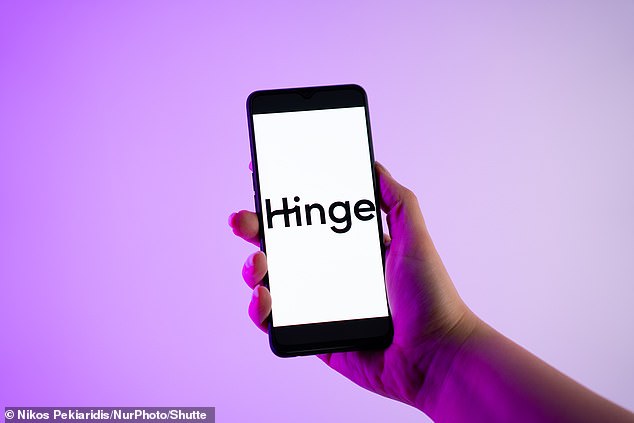Are you TERRIBLE at dating apps? It could be a hidden sign of a common mental condition...
Gone are the days of simply meeting people in the pub or through friends and when Hinge was merely a joint attached to a door.
Instead, we're forced to swipe right endlessly to search for our soulmate.
But with two million Brits estimated to be living with undiagnosed ADHD, being unlucky in love online could be a potential sign of the condition, new research suggests.
Experts found over a fifth of singletons with the mental health condition are more likely to be feel overwhelmed by dating apps than non-ADHD daters.
According to the probe, by dating app Hinge, three in four ADHD daters also report feeling misunderstood using them.

With two million Brits estimated to be living with undiagnosed ADHD, being unlucky in love online could be a potential sign of the condition, new research suggests
A third, meanwhile, admitted to struggling with small talk on dating apps.
Now, a team of PhD researchers and behavioral scientists working for the app want to make it easier for people with ADHD to address these issues.
NHS statistics show more than 230,000 people in England are now taking ADHD meds to combat their inattentiveness and hyperactivity.
Prescription rates jumped by a fifth last year, marking the biggest annual rise since modern records began in 2015.
Data suggests it has largely been fuelled by a rise in women in their 20s and 30s, although rates are still increasing in kids.
In the probe, Hinge quizzed 9,000 users with a clinical ADHD diagnosis on their experiences with online dating.
They found people with ADHD were 22 per cent more likely to feel overwhelmed by dating apps compared to neurotypical daters.
Daters with the condition were also 38 per cent more likely to report finding it difficult to keep conversations going.
Assessing why they felt overwhelmed, 43 per cent confessed they often forget to respond to matches.
However, matches then frequently assume their slow response means they're not interested, they said.
One study volunteer Tarah Clark, an Australian content creator, said: 'I wish my matches understood that when I forgot to respond it wasn't due to a lack of interest — it was just that my brain often got overwhelmed or distracted.
'When someone sent a gentle reminder, I appreciated it.
'A follow-up message helped bring the conversation back to the forefront of my mind, and I was always happy to continue chatting.
'Understanding each other’s challenges made connecting so much easier.'
Almost a third (31 per cent) of daters with ADHD were more likely than neurotypical daters to report they don't like small talk, the researchers found.
Hinge advised ADHD users to provide clarity from the start about being upfront with communication and dating styles.
Researchers also suggested transitioning from a digital conversation to an in-person date after around three days of chatting.
Roughly half of all 18 to 34-year-olds in Britain are believed to have used dating apps.
There are more than 1,400 in the UK alone.
But a recent Forbes survey found that 79 per cent of Generation Z describe themselves as experiencing 'burnout' thanks to online dating.
In March, NHS England announced it would launch a new taskforce to examine the concerning rise in adults and children being diagnosed with ADHD.
Experts have warned rogue private clinics are over-diagnosing the condition and have questioned the widespread prescribing of powerful stimulant drugs to treat it.
The booming market is thought to have been fuelled by celebrities such as model Katie Price and Love Island star Olivia Attwood talking about their ADHD ordeal and waits of up to ten years for an assessment on the NHS.
Social media sites are also full of users telling how medication helped to calm them down, control their fidgeting and boost their concentration.

Fascinating graphs show how ADHD prescriptions have risen over time, with the patient demographic shifting from children to adults with women in particular now driving the increase
Earlier this year, one psychologist warned an uptick in ADHD awareness had distorted society's understanding of neurodiversity and what constitutes 'typical' behaviour.
Dr Lisa Williams, director of The Autism Service, which operates 29 clinics across England and Wales, said: 'If we're not more careful, diagnoses like autism spectrum disorder (ASD) and ADHD are going to be meaningless, with every other person we meet having been labelled as such.'
She added: 'The more we broaden and blur what diagnoses like ASD and ADHD look like, the more people will 'fit' into the category and the less specialist care is available for people living with a true developmental disability.'
But experts have also argued that ADHD was only officially listed in the UK as a disorder that affects adults in 2008.
Before then, it was just recognised as a childhood problem that kids grew out of.
As a result, rather than being over diagnosed, some experts claim many adults now being told they have ADHD have gone years having their symptoms dismissed.





























































































































































































































































































































































































